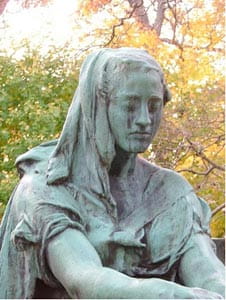This is one in a series of Lenten reflections on the men and women who became the "shouting stones" for Jesus on his way to the Cross. How do the actions of these everyday folk invite us in our Lenten journeys? In this reflection, Monica Coleman imagines the songs of the women in the days leading up to Jesus' crucifixion.
 Singing at the Foot of the Cross
Singing at the Foot of the Cross
Based on Matthew 27:55-56
Mary's house was the kind of place that was never quiet or still. There were always boys and girls from the village running in and out of the front door. There were the rhythms of the hammer coming from Joseph's shop, and the loud shouts of the children and the voices of us women.
Us women sang. We sang the songs that we had always grown up with. It wasn't about harmony; it was about the togetherness of the women. It was about singing our traditions. Singing our sacred songs.
In the morning while we prepared breakfast, we sang our meditations:
Other times we praised:
Always, the songs of our people. I don't even know where they come from. They've always been sung. My mother sang them when I was a child, and her mother before her and her mother before her. We heard some of them in temple and others were the kinds of song you'd only hear softly under a mother's breath while cleaning the house, or rocking the baby, or trying to make it through a tough time. I just can't remember a time when there weren't the women's songs, and I can't remember any time when we weren't singing them at Mary's place.
Not all the songs were happy songs. Sometimes we sang with longing for better times. It was like we were weeping with our voices. It wasn't Babylon like it was for our foremothers. But the Romans were lurking around all the time, taxing us and just punishing people for following the customs we had always followed. I mean, if anyone was caught doing anything that seemed out of place with Roman law and customs, there was always a price to pay. Maybe the tax collector took a little bit more next year. Maybe a brother or uncle would lose an entire harvest and receive no help from the government. It could be anything, but sometimes, it was like we were singing in a strange land. And we had songs for that too.
Nobody knows the trouble I've seen. Nobody knows my sorrow.
My favorites were the songs we sang about the messiah. Men never thought that we women knew much about politics. They were always shooing us to the kitchen when the conversation turned to government and the prophesied one. But we were all the same people and we were all waiting. We were all waiting for that one who would come and deliver us. We were all waiting for the one Isaiah talked about. We were all waiting for that servant leader who would be wonderful and a counselor and a prince of peace.
Any day now, we knew. Because things were getting tough. The taxes were getting higher. The insane cried louder. The poor were getting poorer. The old were dying younger. The girls were bleeding sooner. And worst of all, the crucifixions were more often. It was a tough time and we knew that God would not permit us to endure this much longer. Our salvation had to be coming and it had to be soon. So while the men talked revolution in the parlor, we sang of revolution in the kitchen!
I will call upon the Lord. Who is worthy to be praised. So shall I be saved from my enemies. The Lord lives and blessed be the rock, blessed be the rock of my salvation.
I never really pictured it would happen. I didn't know how this leader would overthrow the government and be overthrown himself. Isaiah described him as mighty, but having a tough time himself. The prophets said he would be despised and rejected. That he would be mocked and spat upon. That people would esteem him stricken and smitten of God. They said that he would be hurt for our wrongdoings. How was this type of leader going to remove this yoke of oppression?! I didn't know. But God said that the leader was coming and we believed, and we talked about it and we looked for it and we continually sang about it. Like we had always done.




